The 150th anniversary of Alikhan Bokeikhanov
Share:

Bokeikhanov's early education took place in a Russian-Kazakh school and at Omsk Technical School (1890 graduate). He later studied at the Imperial Forestry Institute in Saint Petersburg, where he graduated from the Faculty of Economics in 1894. During his youth, he is believed to have been influenced by socialists.
Upon graduating, Bokeikhanov returned to Omsk and spent the next fourteen years there working. He was a participant in the 1896 Shcherbina Expedition, which aimed to research and assess virtually every aspect of Russian-controlled Central Asia from the environment and resources to the culture and traditions of its inhabitants. This was the first of a few similar missions which Bokeikhanov accepted. Among his recorded contributions is "Ovtsevodstvo v stepnom krae" ("Sheep-Breeding in the Steppe Land"), which analyzed animal husbandry in Central Asia.
In 1905, Bokeikhanov's political activism began when he joined the Constitutional Democratic party. He was elected to the First Duma as a member of that party in 1906, and signed the Vyborg Manifesto to protest the dissolution of the Duma by the tsar. As a result of this action, he was arrested and prohibited from living in the Steppe Oblasts. During his exile, he relocated to Samara.
Bokeikhanov became deeply involved with the Alash Orda - a political movement which sought to create an authonomous Kazakhstan. After the October revolution, he was elected in 1917 as president of the Alash Orda government of Alash Autonomy. The same year he was a member of the Turkestan Committee and Commissar of the Provisional Government in Torghai Oblast.
In 1920, after the establishment of Soviet hegemony, Bokeikhanov joined the Bolshevik party and returned to scientific life. His earlier political activities caused the authorities to view him with suspicion, leading to arrests in 1926 and 1928. In 1930, the authorities banished him to Moscow, where he was arrested a final time in 1937 and executed.
It was not until 1989 that the Soviet authorities rehabilitated him.
Bokeikhanov's major political publication was "Kirgizy" ("The Kazakhs") (1910), which was released in the Constitutional Democratic party book on nationalities edited by A. I. Kosteliansky. Bokeikhanov's other activities of this period include assisting in the creation of Qazaq, a Kazakh language newspaper and writing newspaper articles for newspapers including "Dala Walayatynyng Gazeti" (Omsk), "Orenburgskii Listok", "Semipalatinskii Listok", "Turkestanskie Vedomosti" (Tashkent), "Stepnoi Pioner" (Omsk) and "Sary-Arqa" (Semipalatinsk). He was also a contributor to Ay Qap and "Sibirskie Voprosy".
Share: